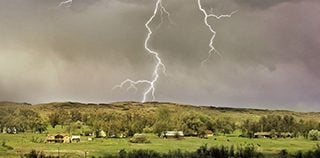Hay fever symptoms. When they’re bad, they’re infuriating. Hay fever, also known as allergic rhinitis, is an allergic reaction to pollen. It can cause irritation and inflammation in your nose and eyes, leading to various annoying – and sometimes painful – symptoms.
How severe your hay fever symptoms are can vary from person to person. How badly it strikes can also depend on pollen levels, which can intensify during hay fever season between late March and September. Read on to find out more about hay fever and allergy symptoms, so you can put pollen in its place.
In this guide:
- How do I know if I have hay fever or a cold?
- What are the main hay fever symptoms?
- Mild hay fever symptoms
- Severe hay fever symptoms
- Long-term hay fever symptoms
- FAQs
How do I know if I have hay fever or a cold?
From runny noses, stuffy sinuses and dull headaches, many hay fever symptoms overlap with those you might get with a cold. At first, it may be tricky to tell exactly what you’re suffering from.
There are a few key things to look out for:
- A cold will often kick in one to three days after you come into contact with the virus and will usually last for up to a week.
- Hay fever symptoms can last for weeks or months depending on the time of year, the type of pollen that affects you most, and how high the pollen count is.
If you’re not sure if you’ve caught a cold or caught wind of hay fever season, take a look at our handy table below to check your symptoms.
| Symptoms | Hay Fever | Cold |
|---|---|---|
| Runny nose | Thin, watery discharge. | Thicker, sometimes yellow discharge. |
| Fever | No fever. | Low grade fever. |
| Aches | Head and earache. | Body aches. |
You can manage hay fever symptoms in various ways, including taking antihistamine tablets and tracking your local pollen count.
Use Your Pollen Pal to check the pollen levels where you are. That way, you’ll know exactly what to expect, so you can be prepared for any pesky pollen in the air.
What are the main hay fever symptoms?
Symptoms of hay fever can vary, but if you do suffer, you’ll usually be struck with one or more of the same key symptoms each hay fever season. A season that is getting longer, unfortunately, due to climate change.
The main signs of hay fever include:
- Sneezing. Whatever your sneeze style – a blaster or a squeaker – it can be a sign that pollen is irritating your nose.
- Snotty or blocked nose. Hay fever is known for blocking noses, just like a cold. You’ll need to become a snot scientist here – nasal discharge from hay fever tends to be clearer and thinner. Go on, take a look…
- Itchy, red or watery eyes. Hay fever can cause your eyes to stream to try and wash out the pollen. They can even become itchy, sticky and red as your immune system reacts to allergens.
- Itchy throat, mouth, nose and ears. Similar to itchy eyes, your body’s immune system kicks in and reacts to the pollen.
- Loss of smell. If food tastes different or things smell weird (and it’s not your partner’s turn to cook), then it could be a sign of hay fever.
- Pain around your temples and forehead. Allergens can inflame your sinuses around your cheekbones and forehead.
- Headache. Sinus pain from allergies can also trigger hay fever headaches.
- Earache. The lining of the tubes in your ear can inflame when it reacts with pollen.
- Tiredness. Hay fever fatigue is a tough side effect of seasonal allergies, particularly if you suffer from more severe hay fever symptoms.
Many of these symptoms can also be related to other illnesses, reactions or even coronavirus. If you’re worried that your symptoms have come on suddenly and unexpectedly, or they’ve gotten much worse, chat to your GP.
Mild hay fever symptoms
While some of us may experience terrible hay fever when the pollen count is high, others may have a mild reaction to pollen.
Common mild symptoms include:
- General tiredness
- Sneezing
- Coughing
- Snotty nose
Severe hay fever symptoms
Itchy eyes, nose, throat and/or mouth are some of the most severe hay fever symptoms. Not only will they leave you feeling cranky, but they can seriously disrupt your daily life, especially if your vision is impaired.
Sometimes, hay fever can even lead to a bloody nose if you’re experiencing extreme nose irritation from pollen. This is usually due to your nose being too dry , or excessive nose blowing. Allergies won’t usually cause nosebleeds unless the inside of your nose becomes damaged from irritation. The best way to avoid it is to prevent or treat your hay fever symptoms.
Certain irritants can also make your hay fever symptoms worse, as your inflamed nose is more sensitive than usual. Exposure to the following may add to your woes:
- Wood and tobacco smoke
- Air pollution and irritating fumes
- Wind
- Aerosol sprays
- Strong odours
- Changes in temperature and humidity
Long-term hay fever symptoms
If you’re lucky, bad hay fever symptoms might only bother you for a few days. But long-term effects can go on for weeks and even months if left untreated.
Symptoms can include:
- Clogged ears
- Sore throat
- Reduced sense of smell
- Headaches
- Tiredness and irritability
- Puffiness or dark circles under your eyes
Even if they start out as mild symptoms, the longer they go on, the more likely they can affect other areas of your health.
If you have any long-term hay fever symptoms, you may also experience:
- Poor sleep quality, leading to ongoing tiredness
- An increase in asthma symptoms
- Lack of energy and productivity
- Ear infections (especially for kids)
- Eye infections and conjunctivitis
- Sinus inflammation and constant congestion that can develop into sinusitis
Finding ways to manage your symptoms can help make hay fever season easier, so you can get back to enjoying spring and summer. Short or long-term, handle whatever symptoms hay fever throws at you with our top hay fever hacks.
FAQs
What is the best antihistamine for hay fever?
There are various types of antihistamines available to help treat allergies and hay fever. Some people find that different antihistamines work well for them, while others don’t. Cetirizine and loratadine are two common, non-drowsy options available from shops and pharmacies. You can ask a pharmacist for advice if you’re not sure what to try.
Does hay fever make you cough?
Not to make you heave, but you could be coughing due to mucus and snot that hasn’t escaped through your nose is dripping down your throat. Nice.
Can you suddenly get hay fever when you’ve never had it before?
People can experience hay fever any time, even if they’ve never had it before. If you already have other allergies, you could be more likely to develop hay fever symptoms. However, some people experience hay fever with no other allergies at all.
What time of day is hay fever at its worst?
Hay fever is often affected by the pollen count, which is usually at its worst at midday . Pollen count typically increases in the morning and drops in the evening, but this can vary from day to day. Using a pollen tracker like Your Pollen Pal lets you check the pollen levels throughout the day, so you’ll never be caught out by peak pollen time.
This article has been expertly reviewed by Jin Zhang, Director of Global Medical Affairs at Kimberly-Clark
Sources / Research:
- https://www.allergyuk.org/information-and-advice/conditions-and-symptoms/11-hay-fever-allergic-rhinitis
- https://www.nhs.uk/conditions/hay-fever
- https://www.aamc.org/news/do-seasonal-allergies-seem-be-getting-worse-blame-climate-change
- https://www.nhs.uk/conditions/nosebleed/
- https://www.nhsinform.scot/illnesses-and-conditions/immune-system/hay-fever/













